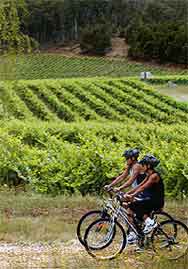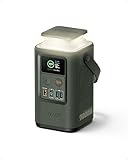
Commuting in Porepunkah
Australia is waking up to the idea of living off-grid as Melbourne’s crippling power outages become more common.
Hundreds if not thousands of people are living off the land in the Melbourne area, reports the Melbourne Herald-Sun. Their nearest road is gravel and there’s not a train or freeway within 100km.
Ralph Whelan, 51, lives in a comfortably ramshackle house he built on a bush block beside Growlers Creek out the back of Wandiligong. He has no grid power, town water or town gas.
He grows his own fruit and veggies, runs some hens and geese, and there’s always fish, rabbits and maybe even venison available.
Mr Whelan has a mini hydro-electric generator, but when there’s no water in Growlers Creek he simply lights a few lanterns or plugs his car battery into an inverter for instant 240-volt power.
“I laugh at Melbourne when I’ve got power and they don’t. When the lights go out and the supermarkets close they’re only three days away from a riot,” he said.
“If it come to the crunch, I wouldn’t starve and I wouldn’t freeze, I’m pretty self-sufficient with my heating, cooking and hot water all off the solid fuel stove.”
Mr Whelan has been self-sustaining since he moved to Growlers more than 20 years ago, having left Walhalla when it got too crowded.
His children grew up on the self-contained property, and used to run their computers, washing machines, the fridge and even small power tools off the current provided by Growlers Creek.
“It all depends on the creek,” he said. “Sometimes you can have everything running all day, but sometimes you have to gear down.”
In the Buckland Valley, south of Porepunkah on the edge of the Mt Buffalo National Park, Ian and Barbara Rosser have been generating their own electricity and producing all their own food for more than 20 years.
“We’re not on the power grid and I like it that way,” Mr Rosser said.
“We’ve got hydro power from a feeder creek into the Buckland River, solar and ex-Telstra NiCad batteries, and in fact with the hydro going we’ve got excess power.
“We use lots of wood over winter for heating, cooking and water, but it’s all fire-killed or fallen. I’ve planted so many trees we’re way beyond carbon neutral.”
The Rossers have run short of hydro power recently because of the drought, but even a little bit of rain is enough to spark his system into action again.
“By the end of this month I’d expect it to be running again and stay running until at least Christmas.”
Mr Rosser even has enough year-round, power to run electric fences around the paddocks where his wiltshire horned sheep, dexter cattle and goats graze.
His organic vegetable gardens and dozens of fruit trees provide the rest of the food supplies, with enough left over for him to provide food for his children and grandchildren in Bright and still more to sell to organic seed and produce merchants.
“I have a wry smile when I hear about Melbourne and power problems,” he said.
powkey Portable Power Station 350W, 260Wh/70,000mAh Backup Lithium Battery, 110V Pure Sine Wave Power Bank with 2 AC Outlets, Portable Generator for Outdoors Camping Travel Hunting Emergency
Now retrieving the rating.
$192.98 (as of April 24, 2024 13:58 GMT +01:00 - More infoProduct prices and availability are accurate as of the date/time indicated and are subject to change. Any price and availability information displayed on [relevant Amazon Site(s), as applicable] at the time of purchase will apply to the purchase of this product.)Amazon Visa
Now retrieving the rating.
$23.00 (as of April 24, 2024 13:58 GMT +01:00 - More infoProduct prices and availability are accurate as of the date/time indicated and are subject to change. Any price and availability information displayed on [relevant Amazon Site(s), as applicable] at the time of purchase will apply to the purchase of this product.)200W Portable Power Station, Powkey 120Wh/33,000mAh Power Bank with AC Outlet, 110V 6 Outputs Solar Generator External Battery Pack with LED Light for Home Use and Outdoor Camping
Now retrieving the rating.
31% OffAnker Power Bank Power Station 60,000mAh,Portable Outdoor Generator 87W with Smart Digital Display, Retractable Auto Lighting and SOS Mode, Home Backup(PowerCore Reserve 192Wh) for Travel, Camping
Now retrieving the rating.
$149.99 (as of April 24, 2024 13:58 GMT +01:00 - More infoProduct prices and availability are accurate as of the date/time indicated and are subject to change. Any price and availability information displayed on [relevant Amazon Site(s), as applicable] at the time of purchase will apply to the purchase of this product.)Foldable Solar Panel Charger 60W with 18V DC Output (11 Connectors) for 100W~350W Portable Power Stations Jackery/Rockpals/Flashfish/Enginstar, Portable Solar Generator for Outdoor Camping Van RV Trip
Now retrieving the rating.
$98.99 (as of April 24, 2024 13:58 GMT +01:00 - More infoProduct prices and availability are accurate as of the date/time indicated and are subject to change. Any price and availability information displayed on [relevant Amazon Site(s), as applicable] at the time of purchase will apply to the purchase of this product.)




